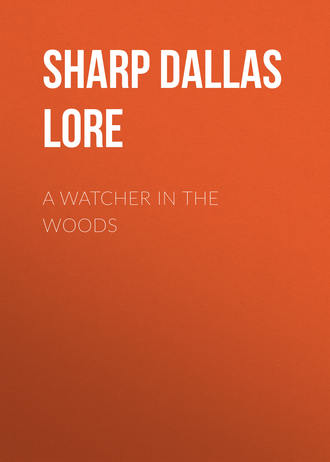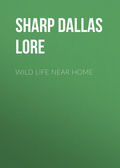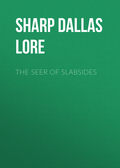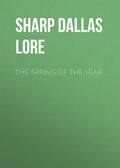
Sharp Dallas Lore
A Watcher in The Woods
IN THE OCTOBER MOON
An October night, calm, crisp, and moonlit! There is a delicate aroma from the falling leaves in the air, as sweet as the scent of fresh-filled haymows. The woods are silent, shadowy, and sleepful, lighted dimly by the moon, as a vague, happy dream lights the dark valley of our sleep. Dreamful is this night world, but yet not dreaming. When, in the highest noon, did every leaf, every breeze, seem so much a self, so full of ready life? The very twigs that lie brittle and dead beneath our feet seem wakeful now and on the alert. In this silence we feel myriad movings everywhere; and we know that this sleep is but the sleep of the bivouac fires, that an army is breaking camp to move under cover of the night. Every wild thing that knows the dark will be stirring to-night. And what softest foot can fall without waking the woods?
Heaped in the hollows of the grove, the autumn leaves lie dead;
They rustle to the eddying gust, and to the rabbit's tread.
Not a mouse can scurry, not a chestnut drop, not a wind whisper among these new-fallen leaves without discovery; even a weasel cannot dart across the moon-washed path and not leave a streak of brown upon the silver, plain enough to follow.
A morning in May is best of all the year to be afield with the birds; but to watch for the wild four-footed things, a moonlight night in October is the choice of the seasons. May-time is bird-time. That is their spring of mate-winning and nest-building, and it bubbles over with life and song. The birds are ardent lovers; they sometimes fight in their wooing: but fighting or singing, they are frank, happy creatures, and always willing to see you. The mammals are just as ardent lovers as the birds, and infinitely more serious. But they are not poets; they are not in the show business; and they want no outsider to come and listen to their pretty story of woe. Their spring, their courting-time, is not a time of song and play. The love-affairs of a timid, soulful-eyed rabbit are so charged and intense as not always to be free from tragedy. Don't expect any attention in the spring, even from that bunch of consuming curiosity, the red squirrel; he has something in hand, for once, more to his mind than quizzing you. Life with the animals then, and through the summer, has too much of love and fight and fury, is too terribly earnest, to admit of any frolic.
But autumn brings release from most of these struggles. There is surcease of love; there is abundance of food; and now the only passions of the furry breasts are such gentle desires as abide with the curious and the lovers of peace and plenty. The animals are now engrossed with the task of growing fat and furry. Troubled with no higher ambitions, curiosity, sociability, and a thirst for adventure begin to work within them these long autumn nights, and not one of them, however wild and fearful, can resist his bent to prowl in the light of the October moon.
To know much of the wild animals at home one must live near their haunts, with eyes and ears open, forever on the watch. For you must wait their pleasure. You cannot entreat them for the sake of science, nor force them in the name of the law. You cannot set up your easel in the meadow, and hire a mink or muskrat to pose for you any time you wish; neither can you call, when you like, at the hollow gum in the swamp and interview a coon. The animals flatly refuse to sit for their pictures, and to see reporters and assessors. But carry your sketch-book and pad with you, and, after a while, in the most unlikely times and places, the wariest will give you sittings for a finished picture, and the most reticent will tell you nearly all that he knows.
At no time of the year are the animals so loquacious, so easy of approach, as along in the October nights. There is little to be seen of them by day. They are cautious folk. By nature most of them are nocturnal; and when this habit is not inherited, fear has led to its acquisition. But protected by the dark, the shy and suspicious creep out of their hiding-places; they travel along the foot-paths, they play in the wagon-roads, they feed in our gardens, and I have known them to help themselves from our chicken-coops. If one has never haunted the fields and woods at night he little knows their multitude of wild life. Many a hollow stump and uninteresting hole in the ground – tombs by day – give up their dead at night, and something more than ghostly shades come forth.
If one's pulse quickens at the sight and sound of wild things stirring, and he has never seen, in the deepening dusk, a long, sniffling snout poked slowly out of a hollow chestnut, the glint of black, beady eyes, the twitch of papery ears, then a heavy-bodied possum issue from the hole, clasping the edge with its tail, to gaze calmly about before lumbering off among the shadows – then he still has something to go into the woods for.
Our forests by daylight are rapidly being thinned into picnic groves; the bears and panthers have disappeared, and by day there is nothing to fear, nothing to give our imaginations exercise. But the night remains, and if we hunger for adventure, why, besides the night, here is the skunk; and the two offer a pretty sure chance for excitement. Never to have stood face to face in a narrow path at night with a full-grown, leisurely skunk is to have missed excitement and suspense second only to the staring out of countenance of a green-eyed wildcat. It is surely worth while, in these days of parks and chipmunks, when all stir and adventure has fled the woods, to sally out at night for the mere sake of meeting a skunk, for the shock of standing before a beast that will not give you the path. As you back away from him you feel as if you were really escaping. If there is any genuine adventure left for us in this age of suburbs, we must be helped to it by the dark.
Who ever had a good look at a muskrat in the glare of day? I was drifting noiselessly down the river, recently, when one started to cross just ahead of my boat. He got near midstream, recognized me, and went under like a flash. Even a glimpse like this cannot be had every summer; but in the autumn nights you cannot hide about their houses and fail to see them. In October they are building their winter lodges, and the clumsiest watcher may spy them glistening in the moonlight as they climb with loads of sedge and mud to the roofs of their sugar-loaf houses. They are readily seen, too, making short excursions into the meadows; and occasionally the desire to rove and see the world will take such hold upon one as to drive him a mile from water, and he will slink along in the shadow of the fences and explore your dooryard and premises. Frequently, in the late winter, I have followed their tracks on these night journeys through the snow between ponds more than a mile apart.
But there is larger game abroad than muskrats and possums. These October nights the quail are in covey, the mice are alive in the dry grass, and the foxes are abroad. Lying along the favorite run of Reynard, you may see him. There are many sections of the country where the rocks and mountains and wide areas of sterile pine-land still afford the foxes safe homes; but in most localities Reynard is rapidly becoming a name, a creature of fables and folk-lore only. The rare sight of his clean, sharp track in the dust, or in the mud along the margin of the pond, adds flavor to a whole day's tramping; and the glimpse of one in the moonlight, trotting along a cow-path or lying low for Br'er Rabbit, is worth many nights of watching.
I wish the game-laws could be amended to cover every wild animal left to us. In spite of laws they are destined to disappear; but if the fox, weasel, mink, and skunk, the hawks and owls, were protected as the quail and deer are, they might be preserved a long time to our meadows and woods. How irreparable the loss to our landscape is the extinction of the great golden eagle! How much less of spirit, daring, courage, and life come to us since we no longer mark the majestic creature soaring among the clouds, the monarch of the skies! A dreary world it will be out of doors when we can hear no more the scream of the hawks, can no longer find the tracks of the coon, nor follow a fox to den. We can well afford to part with a turnip, a chicken, and even with a suit of clothes, now and then, for the sake of this wild flavor to our fenced pastures and close-cut meadows.
I ought to have named the crow in the list deserving protection. He steals. So did Falstaff. But I should miss Falstaff had Shakspere left him out; yet no more than I should miss the crow were he driven from the pines. They are both very human. Jim Crow is the humanest bird in feathers. The skunk I did include in the list. It was not by mistake. The skunk has a good and safe side to him, when we know how to approach him. The skunk wants a champion. Some one ought to spend an entire October moon with him and give us the better side of his character. If some one would take the trouble to get well acquainted with him at home, it might transpire that we have grievously abused and avoided him.
There is promise of a future for the birds in their friendship for us and in our interest and sentiment for them. Everybody is interested in birds; everybody loves them. There are bird-books and bird-books and bird-books – new volumes in every publisher's spring announcements. Every one with wood ways knows the songs and nests of the more common species. But this is not so with the four-footed animals. They are fewer, shyer, more difficult of study. Only a few of us are enthusiastic enough to back into a hole in a sand-bank and watch all night for the "beasts" with dear old Tam Edwards.
But such nights of watching, when every fallen leaf is a sentinel and every moonbeam a spy, will let us into some secrets about the ponds and fields that the sun, old and all-seeing as he is, will never know. Our eyes were made for daylight; but I think if the anatomists tried they might find the rudiments of a third, a night eye, behind the other two. From my boyhood I certainly have seen more things at night than the brightest day ever knew of. If our eyes were intended for day use, our other senses seem to work best by night. Do we not take the deepest impressions when the plates of these sharpened senses are exposed in the dark? Even in moonlight our eyes are blundering things; but our hearing, smell, and touch are so quickened by the alertness of night that, with a little training, the imagination quite takes the place of sight – a new sense, swift and vivid, that adds an excitement and freshness to the pleasure of out-of-door study, impossible to get through our two straightforward, honest day eyes.
Albeit, let us stay at home and sleep when there is no moon; and even when she climbs up big and round and bright, there is no surety of a fruitful excursion before the frosts fall. In the summer the animals are worn with home cares and doubly wary for their young; the grass is high, the trees dark, and the yielding green is silent under even so clumsy a crawler as the box-turtle. But by October the hum of insects is stilled, the meadows are mown, the trees and bushes are getting bare, the moon pours in unhindered, and the crisp leaves crackle and rustle under the softest-padded foot.







